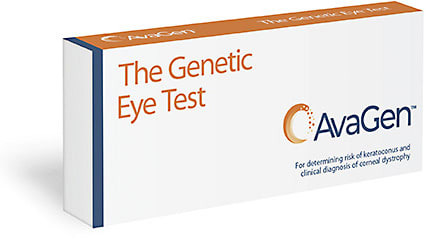Genetic test enables early detection; facilitates management decisions
AvaGen, The Genetic Eye Test, from Avellino Lab USA, Inc., aids in determining a patient’s risk for keratoconus and corneal dystrophies, such as Reis-Bucklers dystrophy and Theil-Behnke dystrophy, enabling early detection and facilitating management decisions.
With regard to keratoconus, the test examines 75 related genes and more than 2,000 variants of those genes to develop an actionable genetic risk score. Additionally, the test considers the confounding factor of ethnicity into its results, as keratoconus is particularly prevalent in Black and Latino populations in the United States.
Eric Donnenfeld, M.D., founding partner of Ophthalmic Consultants of Long Island, NY, and clinical professor of ophthalmology at New York University, says early stages of keratoconus, in particular, have traditionally been difficult to diagnose, so AvaGen is meeting an important need.
“With corneal cross-linking proven to slow and commonly stop keratoconus progression, it’s arguably more important than ever that we’re able to make those early diagnoses,” he says.
Patient Candidates
William B. Trattler, M.D., a refractive corneal and cataract eye surgeon at the Center for Excellence in Eye Care, in Miami, says that AvaGen is most useful for patients who have borderline topography, as well as for family members of patients who have already been diagnosed with keratoconus.
“If you have a patient who comes in for LASIK and is borderline for keratoconus but does not carry the genetic risk, there’s some peace of mind that comes with that,” he explains. “On the flip side, for patients who do have greater risk, it gives us the ability to monitor them much more closely. We recently used AvaGen on a child of one of my patients, and their risk came back as moderate. We’ll now follow that child much closer.”
Test Utilization
Elizabeth Yeu, M.D., a refractive eye surgeon with Virginia Eye Consultants, in Norfolk, Va., says that the test, which costs to $300, is easy to perform. Specifically, it requires a cheek swab, which is then sent to Avellino’s high-complexity CLIA-certified lab for analysis.
From there, the doctor receives the results in approximately 10 days in a report through a HIPAA-secured patient portal. Additionally, genetic counselling is provided alongside the test results, so doctors and their patients have a clear understanding of the results, and their effect on patient management.
“I tell patients that, to me, this data is priceless,” she adds. “This is more than something that is ‘good to know’ — it has true implications for their clinical prognosis. This data can impact everything from when I’d treat to what follow-up is needed, and even which surgery we choose. We’ve never had the ability to make these decisions before with actual information at our fingertips.”

Surgical Considerations
Dr. Donnenfeld adds that with cases of keratoconus on the rise, being able to identify which patients are at risk ahead of LASIK is invaluable.
“Having that piece of data allows us to make decisions regarding who should have LASIK and who is better off having PRK — or no surgery at all,” he continues. “Patients are coming in for LASIK and PRK in record numbers — many of whom are unhappy with their vision. But when they have mildly irregular topography, this genetic testing gives us another important piece of data to make the best decision for the patient.”
Dr. Yeu agrees that with this genetic data, her conversations around refractive surgery have changed.
“I can now help guide the patient toward the choices that are best for their long-term outcome — not just giving them vision for one or two years, but for the rest of their lives without running into complications,” she says. “We’re also able to make decisions as to whether we should go through corneal cross-linking sooner rather than later. It boils down to potentially preventing more invasive surgery down the line.” CP
Drs. Donnenfeld, Trattler, and Yeu report a relationship with Avellino Lab USA, Inc.








